高中英语-定语从句语法点课件(共100张PPT)
文档属性
| 名称 | 高中英语-定语从句语法点课件(共100张PPT) | 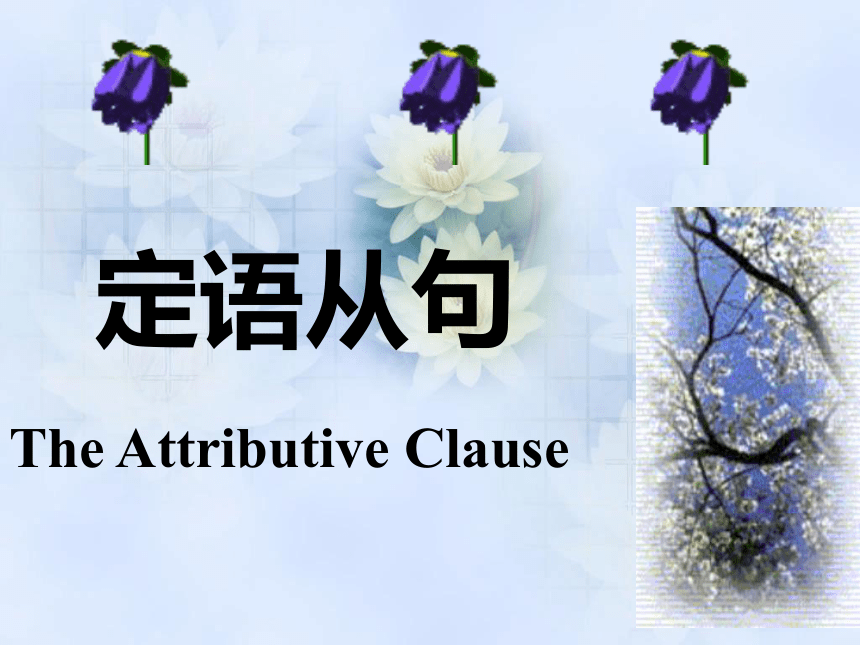 | |
| 格式 | zip | ||
| 文件大小 | 1.1MB | ||
| 资源类型 | 教案 | ||
| 版本资源 | 通用版 | ||
| 科目 | 英语 | ||
| 更新时间 | 2019-10-17 22:32:22 | ||
图片预览

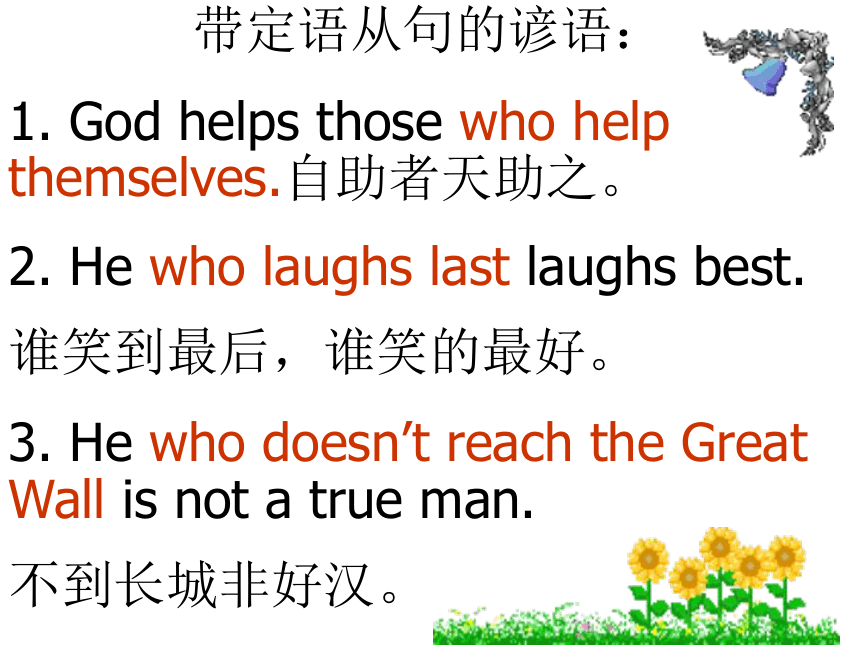
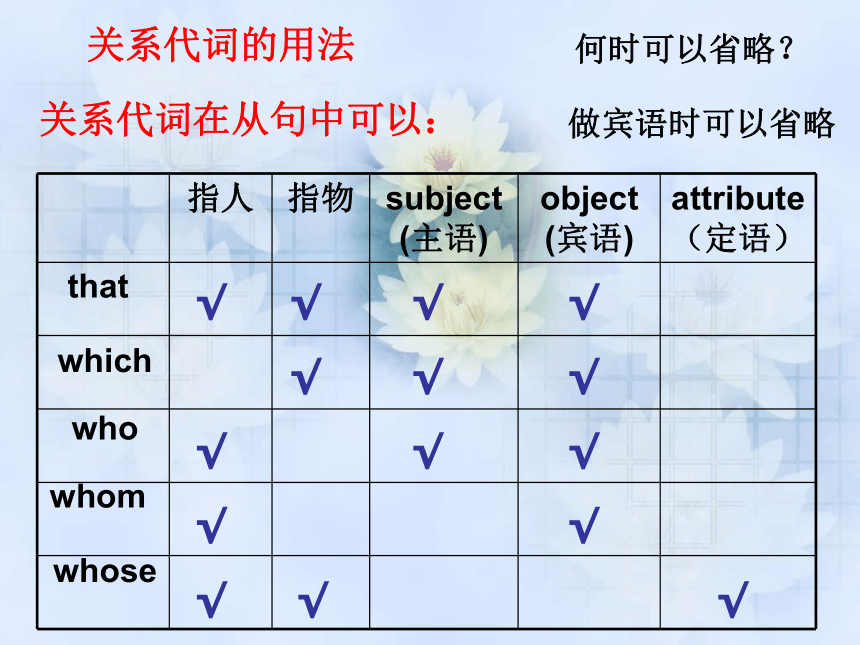
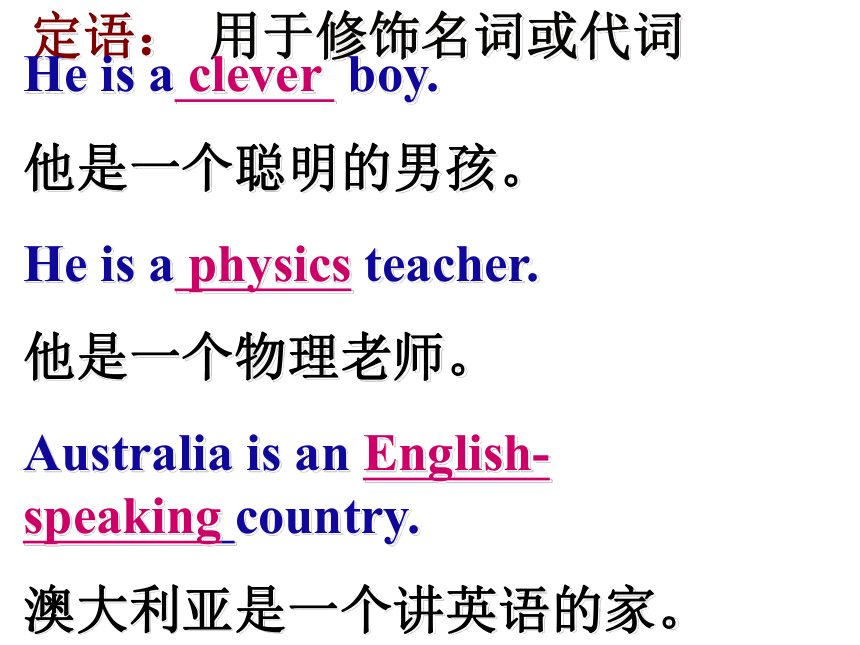
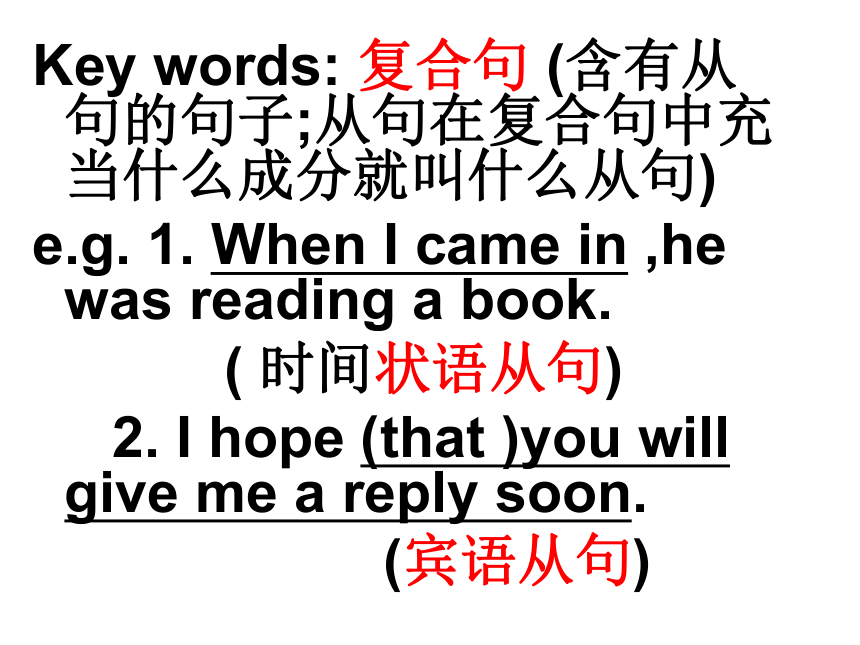
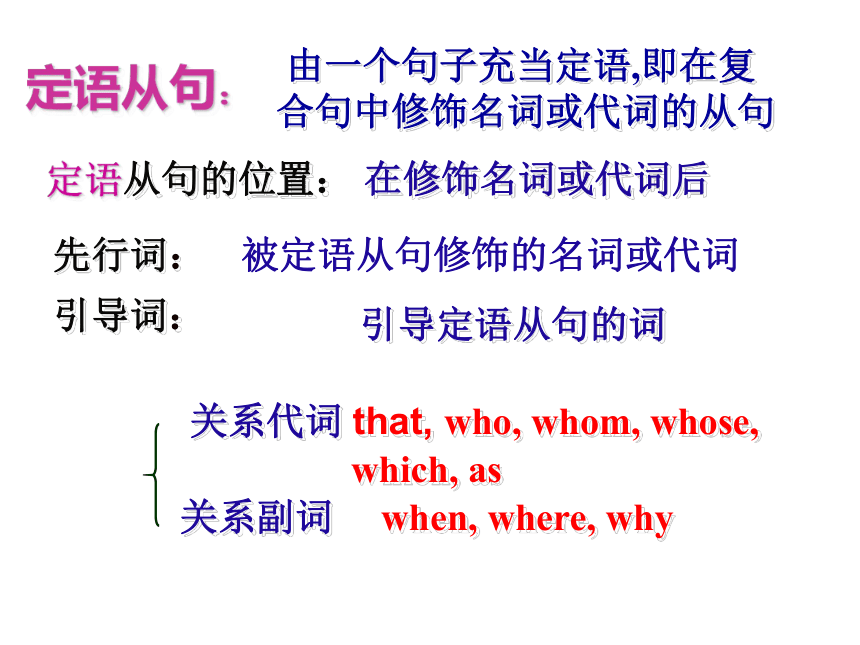

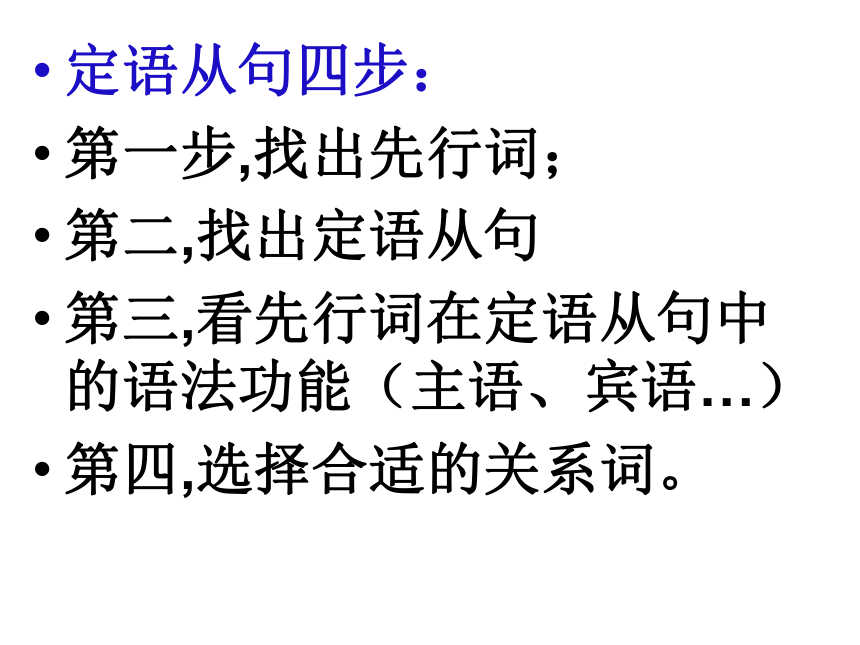
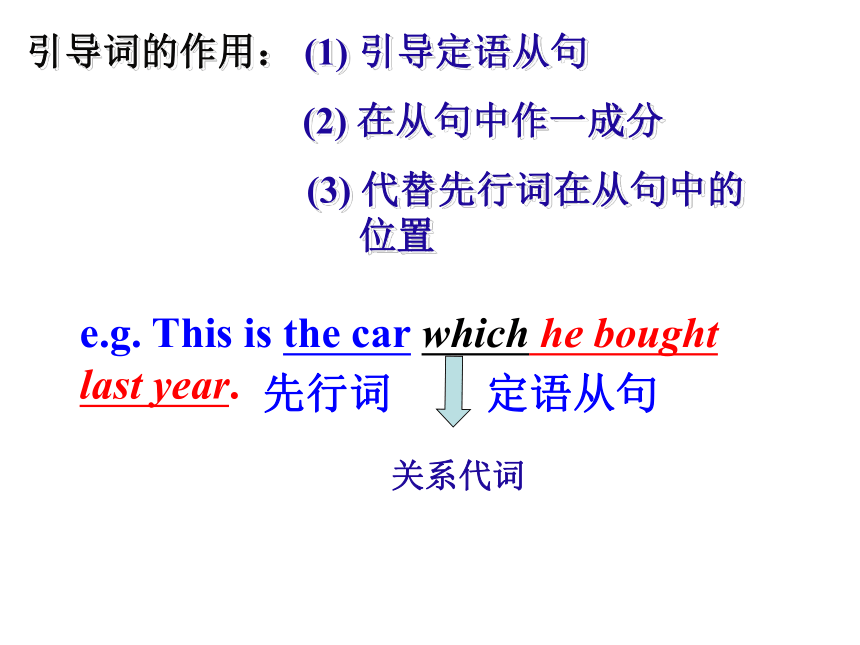
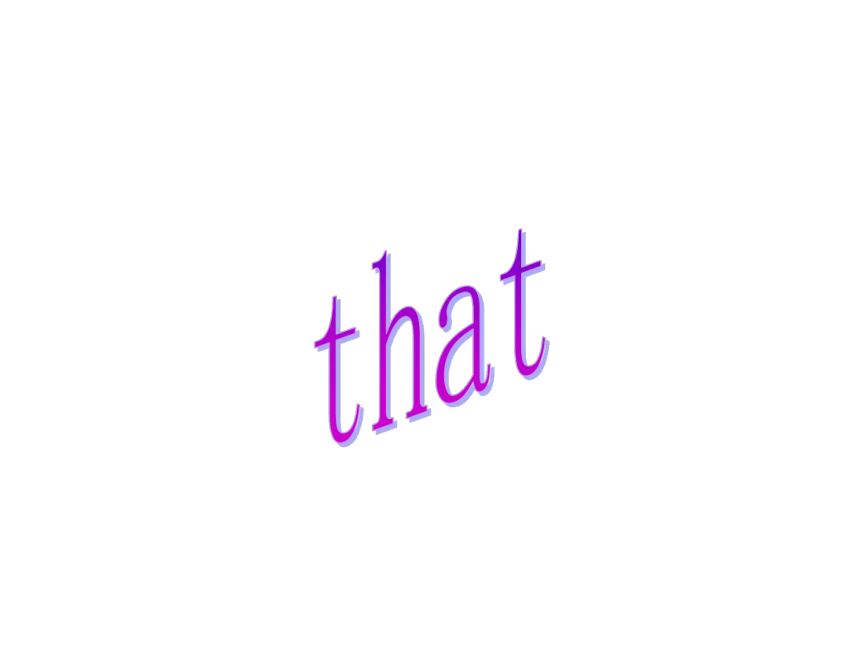
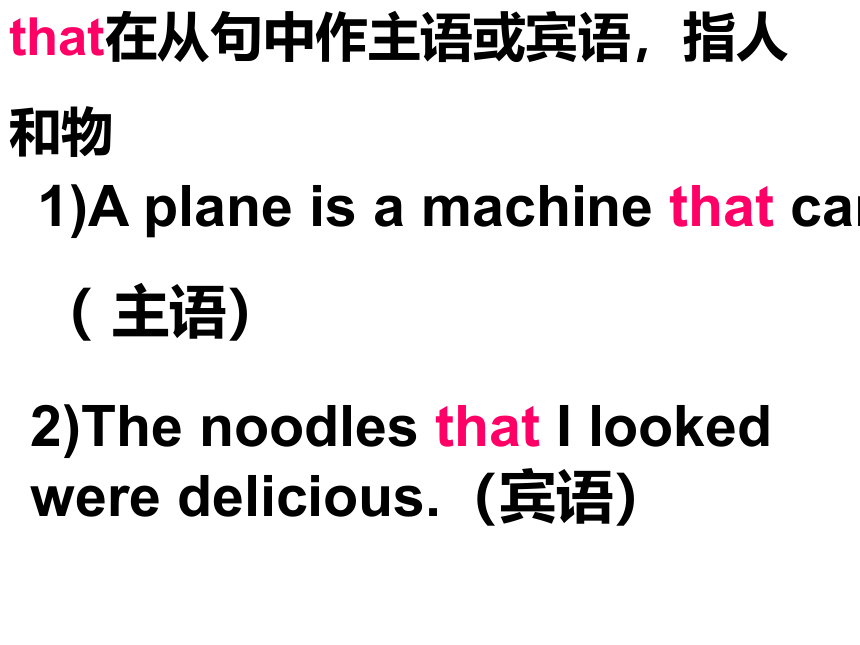
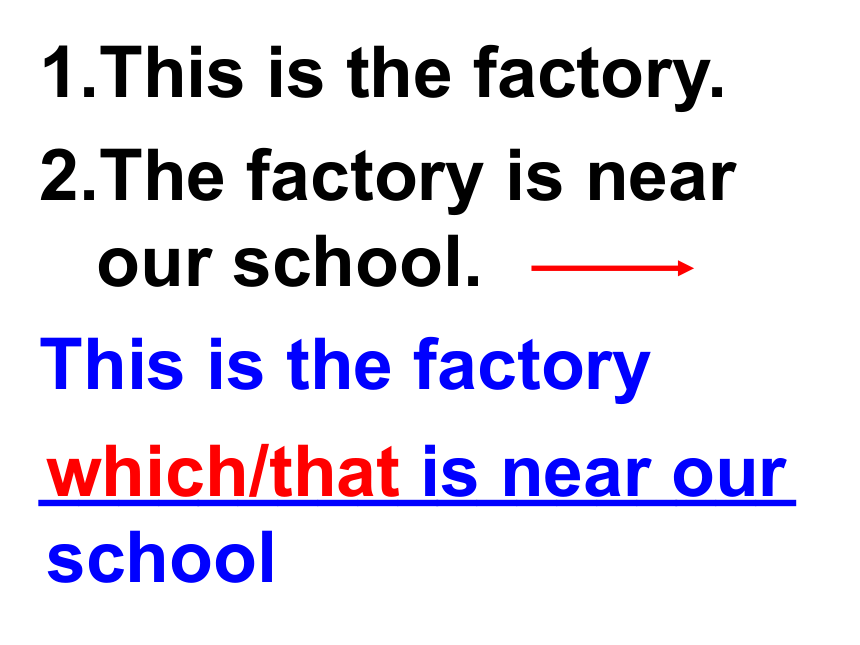
文档简介
(共100张PPT)
定语从句
The Attributive Clause
带定语从句的谚语:
1. God helps those who help themselves.自助者天助之。
2. He who laughs last laughs best.
谁笑到最后,谁笑的最好。
3. He who doesn’t reach the Great Wall is not a true man.
不到长城非好汉。
关系代词的用法
关系代词在从句中可以:
whom
who
which
that
whose
√
√
√
√
√
√
√
√
√
√
√
√
√
√
√
何时可以省略?
做宾语时可以省略
指人 指物 subject (主语) object (宾语) attribute(定语)
定语:
用于修饰名词或代词
He is a clever boy.
他是一个聪明的男孩。
He is a physics teacher.
他是一个物理老师。
Australia is an English-speaking country.
澳大利亚是一个讲英语的家。
Key words: 复合句 (含有从句的句子;从句在复合句中充当什么成分就叫什么从句)
e.g. 1. When I came in ,he was reading a book.
( 时间状语从句)
2. I hope (that )you will give me a reply soon.
(宾语从句)
定语从句:
由一个句子充当定语,即在复合句中修饰名词或代词的从句
定语从句的位置:
在修饰名词或代词后
先行词:
引导词:
引导定语从句的词
关系代词 that, who, whom, whose, which, as
关系副词 when, where, why
被定语从句修饰的名词或代词
For example:
This is a book which tells about
space knowledge.
先行词
关系代词
定语从句
定语从句四步:
第一步,找出先行词;
第二,找出定语从句
第三,看先行词在定语从句中的语法功能(主语、宾语…)
第四,选择合适的关系词。
e.g. This is the car which he bought last year.
先行词
定语从句
引导词的作用: (1) 引导定语从句
(2) 在从句中作一成分
(3) 代替先行词在从句中的 位置
关系代词
that在从句中作主语或宾语,指人
和物
1)A plane is a machine that can fly.
( 主语)
2)The noodles that I looked were delicious.(宾语)
This is the factory.
The factory is near our school.
This is the factory
___________________
which/that is near our school
1.This is the factory.
2.I visited the factory.
This is the factory
__________________
which/that I visited.
Which 在从句中作主语或宾语,指物
1) They planted the trees which didn’t need much water. (主语 )
2) The fish which we bought were not fresh. (宾语)
This is the factory.
The factory is near our school.
This is the factory
___________________
which/that is near our school
1.This is the factory.
2.I visited the factory.
This is the factory
__________________
which/that I visited.
who 在从句中作主语和宾语,指人
1) The foreigner who visited our school yesterday is from Canada.(主语)
2) Comrade Li is a man who we should learn from (宾语)
I have a friend.
I have a selfless friend.
I have a friend
_______________
who is selfless
whom 在从句中作宾语,指人
3) The person to whom you just talked is Mr. Li. (宾语)
4) Mr. Read is the professor
to whom you should write .
(宾语)
2) This is the book whose cover is blue.
whose 在从句中作定语,指人或物
1) Miss Flower is the teacher whose house caught fire last week.
whose 引导的定语从句应注意以下几点:
1.whose 引导定语从句,在从句中作定语其后应紧跟名词
That’s the child whose drawing we looked at just now.
2. whose 引导定语从句,其先行词可指人,也可指物
I saw some trees whose leaves were black with disease.
3. whose 在定语从句中与它所修饰的名词一起可作介词宾语,可以与介词一起放在先行词与从句之间
Tom , on whose bike I went to school is a friend of mine.
4. Whose 的先行词指物时, 可用of which 代替whose.指人不可
whose + n = the + n + of which= of which+ the + n. He lives in the room whose window faces south.
= He lives in the room, the window of which faces south.
1) Do you know the man ________is standing over there?
2) The girl ____________
we were talking about is Mary.
who/that
who(m)/that
3) The book _________ is about the USA has been lost.
4) Did you see the pen __________ I lost yesterday?
that/which
that/which
5)There are some people _______ faces you can’t forget.
6) I am sitting in the chair ______legs are broken.
whose
whose
There are some people whose faces you can’t forget.
There are some people of whom the faces you can’t forget.
I am sitting in the chair whose legs are broken.
I am sitting in the chair of which the legs are broken.
关系代词who, that作主语
1. Your friend came to see you yesterday.
2. Your friend studies in Beijing University.
Your friend who/that studies in Beijing University came to see you yesterday.
关系代词whom, that 作宾语
1. He is the man.
2.You have been waiting for the man.
He is the man (whom/that) you have
been waiting for.
关系代词 which, that 作主语
1. It sounded like a train.
2. A train was going under my house.
It sounded like a train which/ that
was going under my house.
关系代词which/ that 作宾语
1. The earth is a big ball.
2. We live on the earth.
The earth (which/ that) we live on
is a big ball.
关系代词whose 作定语
1. Do you know the man?
2. The man’s watch is missing.
Do you know the man whose watch
is missing?
where引导的定语从句修饰表示地点的名词,并在定语从句中作地点状语, 相当于“介词+ 关系代词(which)”。
where=in which=at which
1.This is the factory.
2.I worked in the factory.
★This is the factory
____________________
which/that I worked in.
★ This is the factory in _____ I worked.
which
=
where
1.We visited the house.
2. Luxun once lived in the house.
We visited the house __________ Luxun once lived.
where
=
in which
1.This is the library _________ has many books.
2. This is the library __________ I visited.
3. This is the library __________ I read books.
which/that
which/that
in which/where
^
the library
^
the library
^
in the library
when引导的定语从句修饰表示时间的名词,并在定语从句中作时间状语,相当于“介词+关系代词(which)”。
关系副词 when=in which=at which=on which
1. I’ll never forget the day.
2. I joined the Party on the day.
I’ll never forget the day _________ I joined the Party.
when
=
on which
We still remember that August ___________ we traveled together.
^
in that August
in which/when
This is the day ____________ we can’t forget.
This is the day ____________ I was born.
which/that
on which/when
the day
^
^
on the day
why引导的定语从句修饰表示原因的名词,并在定语从句中作原因状语,相当于“介词+关系代词(which)”。
why=for which
1. There are many reasons.
2. People like traveling for many reasons.
There are many reasons
_______ people like traveling.
for which
why
=
This is the reason ___________ he gave me.
This is the reason ___________ he was late.
for which/why
which/that
the reason
^
^
for the reason
as 引导定语从句常出现于the same…as…, such…as…, as…as…, so…as…中。As 引导的定语从句常用省略形式,as 在从句中既可指人或物,也可指整个句子,指整个句子时可位于句首,句尾或句中。As 引导定语从句时,在从句中常作主语,宾语,表语等。
Such people as have made great contributions to the world should be greatly respected.
那些对世界作出巨大贡献的人应受到极大的尊重。
(as与such连用,在定语从句中做主语)语,表语等。
Let’s meet at the same place as we did yesterday.
咱们在昨天见面的同一地方见面吧。
(as 与the same连用,在定语从句中做状语)
Shakespeare is a famous writer, as everybody knows.
众所周知, 莎士比亚是著名的作家。
(as代替整个从句,做knows 的宾语,位于句尾)
Shakespeare, as everybody knows, is a famous writer.
(位于句中)
这类as引导的定语从句通常有固定表达。
As I can remember正如我所记的
As often happens 正如经常发的
As you see 这一点你明白
As is well known 众所周知
As is expected 正如预料的那样
As can be seen 看得出来
方式 关系副词 that = in which
This is the way that( in which) he did it
I don’t lie the way that(=in which) you laugh at her
提醒一:关系代词或关系副词的选择有两个原则:1)先行词是人还是物;2)先行词在从句中作什么成分。若先行词在从句中作主语,宾语,或定语,则选关系代词;若在从句中作状语,则选关系副词。
1We will remember those days that/which we spent together.(作宾语)
2we will remember those days when we played by the sea.(作状语)
提醒二:关系代词在定语从句中作主语时,根据先行词的单复数决定从句谓语动词的单复数。
1He is the only one of the students who knows French (the only one 为先行词)
2He is one of the students who know French (students 为先行词)
提醒三:关系代词的省略:在限制性定语从句中,关系代词作动词宾语或介词宾语(这时介词不能在关系代词前)时常可省略。
The boy (that/who/whom) we saw last night was Tom
提醒四:定语从句常见错误
1缺先行词:Is this school that
you visited last year?
该句缺先行词,应在school后面
加上the one
2 缺引导词:Chinese eat a lot of sugar often have bad teeth
应在children后面加上who 关系代词作主语时不能省略
3成分重复:This is the house where I lived there years ago.
Where 和there 句子成分重复,应去掉there
提醒五 关系副词和关系代词的判断方法
关系副词和关系代词的选择是根据先行词在定语从句中作的成分。若是做状语,则用关系副词或“介词+which” 若是作主语或宾语,则用关系代词。例如:
I will never forget the days (that/ which) I spent with my teacher
I will never forget the days when I played with you
The factory (that/which) we visited yesterday was built last year
The factory where he works was built last year
This is the reason (that/which) she gave me for doing it
Do you know the reasons why he came late?
但要注意在以下8种情况下,指物时用that 不用which, who
注意!
1.先行词是all, any, everything, anything, nothing ,something, much, little, few, none ,the one 等时
① There is much that should be used.
② You can take any seat that is free.
2.先行词被all, any , no, only, little, much, very, every, some, few, none 等修饰时
① I have read all the books (that) you gave me.
② Every dictionary that our library bought is good.
3.先行词被序数词或最高级修饰时。
① This is the most interesting book that I have ever read.
② The first lesson that I learned will never be forgotten.
4.先行词被the only, the very, the same, the last修饰时。
① This is the very book that belongs to him.
② The Great Wall is the last place that Mr. Smith is going to visit before he leaves Beijing.
5. 在以 which, who作主语的特殊疑问句中的定语从句中
① Who is the man that is reading a book there?
② Which is the magazine that you borrowed from the reading room?
6.当先行词既有表示人又有表示物的词时
① We talked of the things and persons that we remembered.
7. 当先行词在定语从句中做表语时,无论先行词是人还是物
① China is no longer the country that she was.
8.主句以there be 开头时
① There is little that I can do to make up for the lost time.
不用that的场合如下:
1)非限制性定语从句中:是对所修饰的成分作进一步说明,通常和主句间用逗号隔开,将从句拿掉后其他部分仍可成立 Last night ,I saw a very good film, which was about the Long March .
2)介词放在关系代词之前时
This is the man from whom I learnt the news
3)句中出现了that,或先行词是that时
I have found that which I was looking for.
二、只用who的情况
One ____ has nothing to fear dares to tell the truth.
The ones ____ laugh at the disabled are not good students.
Anyone ____ fails to finish the task should be punished.
Those ____ want to go to The Great Wall sigh up here.
who
who
who
who
先行词是one, ones, anyone, those时用who.
定语从句必须注意的特殊例子
1.先行词为situation , case , stage, point, position关系词要用where, in which
eg. Can you imaging the situation where/ in which you can use the word.
2.先行词为way ,关系词要用that, in which 或省略
eg. Do you know the way (that/in which/--) he worked the problem.
3.定语从句的必须注意的两个句型。
Is this school the one we visited that year?
Is this the school that we visited that year ?
He is one of the students who are from the south.
He is the (only) one of the students who is from the south.
限制性定语从句用来修饰和限制先行词,与先行词的关系非常密切,它所修饰的先行词代表一个(些)或一类特写的人或物,说明先行词的性质,身份,特征等状况。如果去掉,则意思含混不清。
A doctor is a person who looks after people’s health.
上边的例句如果去掉who looks after people’s health.就成了A doctor is a person(医生是人), 完全失去了原句的意义。
非限制性定语从句起补充附带说明作用,去掉也不会影响对全句的理解,在非限制性定语从句的前面往往有逗号隔开,如若将非限制性定语从句放在句子中间,其前后都需要用逗号隔开。
Yesterday Jimmy left for Canada, where he had stayed two years.
昨天,吉米动身到加拿大去了,他曾在那儿呆了两年。
Tom’s father, who is over sixty, still works hard day and night.
汤姆的父亲已经六十多岁了,但他仍然从早到晚辛勤的工作。
引导非限制性定语从句的关系代词如下表所示:
指代对象 指代人 指代物
主格 who which, as
宾格 whom which, as
所有格 of whom, whose(指代人) which, of which, whose(指代物)
注意:关系代词that 不引导非限制性定语从句。
关系副词why 不能引导非限制性定语从句
引导非限制性定语从句的关系副词主要有when, where
She said she had finished her work, which I doubted very much.
她说她已经完成了这项工作,我对此深表怀疑。
As most people know, Fujian is famous for tea.
周所周知,福建以茶出名。
定语从句
The Attributive Clause
带定语从句的谚语:
1. God helps those who help themselves.自助者天助之。
2. He who laughs last laughs best.
谁笑到最后,谁笑的最好。
3. He who doesn’t reach the Great Wall is not a true man.
不到长城非好汉。
关系代词的用法
关系代词在从句中可以:
whom
who
which
that
whose
√
√
√
√
√
√
√
√
√
√
√
√
√
√
√
何时可以省略?
做宾语时可以省略
指人 指物 subject (主语) object (宾语) attribute(定语)
定语:
用于修饰名词或代词
He is a clever boy.
他是一个聪明的男孩。
He is a physics teacher.
他是一个物理老师。
Australia is an English-speaking country.
澳大利亚是一个讲英语的家。
Key words: 复合句 (含有从句的句子;从句在复合句中充当什么成分就叫什么从句)
e.g. 1. When I came in ,he was reading a book.
( 时间状语从句)
2. I hope (that )you will give me a reply soon.
(宾语从句)
定语从句:
由一个句子充当定语,即在复合句中修饰名词或代词的从句
定语从句的位置:
在修饰名词或代词后
先行词:
引导词:
引导定语从句的词
关系代词 that, who, whom, whose, which, as
关系副词 when, where, why
被定语从句修饰的名词或代词
For example:
This is a book which tells about
space knowledge.
先行词
关系代词
定语从句
定语从句四步:
第一步,找出先行词;
第二,找出定语从句
第三,看先行词在定语从句中的语法功能(主语、宾语…)
第四,选择合适的关系词。
e.g. This is the car which he bought last year.
先行词
定语从句
引导词的作用: (1) 引导定语从句
(2) 在从句中作一成分
(3) 代替先行词在从句中的 位置
关系代词
that在从句中作主语或宾语,指人
和物
1)A plane is a machine that can fly.
( 主语)
2)The noodles that I looked were delicious.(宾语)
This is the factory.
The factory is near our school.
This is the factory
___________________
which/that is near our school
1.This is the factory.
2.I visited the factory.
This is the factory
__________________
which/that I visited.
Which 在从句中作主语或宾语,指物
1) They planted the trees which didn’t need much water. (主语 )
2) The fish which we bought were not fresh. (宾语)
This is the factory.
The factory is near our school.
This is the factory
___________________
which/that is near our school
1.This is the factory.
2.I visited the factory.
This is the factory
__________________
which/that I visited.
who 在从句中作主语和宾语,指人
1) The foreigner who visited our school yesterday is from Canada.(主语)
2) Comrade Li is a man who we should learn from (宾语)
I have a friend.
I have a selfless friend.
I have a friend
_______________
who is selfless
whom 在从句中作宾语,指人
3) The person to whom you just talked is Mr. Li. (宾语)
4) Mr. Read is the professor
to whom you should write .
(宾语)
2) This is the book whose cover is blue.
whose 在从句中作定语,指人或物
1) Miss Flower is the teacher whose house caught fire last week.
whose 引导的定语从句应注意以下几点:
1.whose 引导定语从句,在从句中作定语其后应紧跟名词
That’s the child whose drawing we looked at just now.
2. whose 引导定语从句,其先行词可指人,也可指物
I saw some trees whose leaves were black with disease.
3. whose 在定语从句中与它所修饰的名词一起可作介词宾语,可以与介词一起放在先行词与从句之间
Tom , on whose bike I went to school is a friend of mine.
4. Whose 的先行词指物时, 可用of which 代替whose.指人不可
whose + n = the + n + of which= of which+ the + n. He lives in the room whose window faces south.
= He lives in the room, the window of which faces south.
1) Do you know the man ________is standing over there?
2) The girl ____________
we were talking about is Mary.
who/that
who(m)/that
3) The book _________ is about the USA has been lost.
4) Did you see the pen __________ I lost yesterday?
that/which
that/which
5)There are some people _______ faces you can’t forget.
6) I am sitting in the chair ______legs are broken.
whose
whose
There are some people whose faces you can’t forget.
There are some people of whom the faces you can’t forget.
I am sitting in the chair whose legs are broken.
I am sitting in the chair of which the legs are broken.
关系代词who, that作主语
1. Your friend came to see you yesterday.
2. Your friend studies in Beijing University.
Your friend who/that studies in Beijing University came to see you yesterday.
关系代词whom, that 作宾语
1. He is the man.
2.You have been waiting for the man.
He is the man (whom/that) you have
been waiting for.
关系代词 which, that 作主语
1. It sounded like a train.
2. A train was going under my house.
It sounded like a train which/ that
was going under my house.
关系代词which/ that 作宾语
1. The earth is a big ball.
2. We live on the earth.
The earth (which/ that) we live on
is a big ball.
关系代词whose 作定语
1. Do you know the man?
2. The man’s watch is missing.
Do you know the man whose watch
is missing?
where引导的定语从句修饰表示地点的名词,并在定语从句中作地点状语, 相当于“介词+ 关系代词(which)”。
where=in which=at which
1.This is the factory.
2.I worked in the factory.
★This is the factory
____________________
which/that I worked in.
★ This is the factory in _____ I worked.
which
=
where
1.We visited the house.
2. Luxun once lived in the house.
We visited the house __________ Luxun once lived.
where
=
in which
1.This is the library _________ has many books.
2. This is the library __________ I visited.
3. This is the library __________ I read books.
which/that
which/that
in which/where
^
the library
^
the library
^
in the library
when引导的定语从句修饰表示时间的名词,并在定语从句中作时间状语,相当于“介词+关系代词(which)”。
关系副词 when=in which=at which=on which
1. I’ll never forget the day.
2. I joined the Party on the day.
I’ll never forget the day _________ I joined the Party.
when
=
on which
We still remember that August ___________ we traveled together.
^
in that August
in which/when
This is the day ____________ we can’t forget.
This is the day ____________ I was born.
which/that
on which/when
the day
^
^
on the day
why引导的定语从句修饰表示原因的名词,并在定语从句中作原因状语,相当于“介词+关系代词(which)”。
why=for which
1. There are many reasons.
2. People like traveling for many reasons.
There are many reasons
_______ people like traveling.
for which
why
=
This is the reason ___________ he gave me.
This is the reason ___________ he was late.
for which/why
which/that
the reason
^
^
for the reason
as 引导定语从句常出现于the same…as…, such…as…, as…as…, so…as…中。As 引导的定语从句常用省略形式,as 在从句中既可指人或物,也可指整个句子,指整个句子时可位于句首,句尾或句中。As 引导定语从句时,在从句中常作主语,宾语,表语等。
Such people as have made great contributions to the world should be greatly respected.
那些对世界作出巨大贡献的人应受到极大的尊重。
(as与such连用,在定语从句中做主语)语,表语等。
Let’s meet at the same place as we did yesterday.
咱们在昨天见面的同一地方见面吧。
(as 与the same连用,在定语从句中做状语)
Shakespeare is a famous writer, as everybody knows.
众所周知, 莎士比亚是著名的作家。
(as代替整个从句,做knows 的宾语,位于句尾)
Shakespeare, as everybody knows, is a famous writer.
(位于句中)
这类as引导的定语从句通常有固定表达。
As I can remember正如我所记的
As often happens 正如经常发的
As you see 这一点你明白
As is well known 众所周知
As is expected 正如预料的那样
As can be seen 看得出来
方式 关系副词 that = in which
This is the way that( in which) he did it
I don’t lie the way that(=in which) you laugh at her
提醒一:关系代词或关系副词的选择有两个原则:1)先行词是人还是物;2)先行词在从句中作什么成分。若先行词在从句中作主语,宾语,或定语,则选关系代词;若在从句中作状语,则选关系副词。
1We will remember those days that/which we spent together.(作宾语)
2we will remember those days when we played by the sea.(作状语)
提醒二:关系代词在定语从句中作主语时,根据先行词的单复数决定从句谓语动词的单复数。
1He is the only one of the students who knows French (the only one 为先行词)
2He is one of the students who know French (students 为先行词)
提醒三:关系代词的省略:在限制性定语从句中,关系代词作动词宾语或介词宾语(这时介词不能在关系代词前)时常可省略。
The boy (that/who/whom) we saw last night was Tom
提醒四:定语从句常见错误
1缺先行词:Is this school that
you visited last year?
该句缺先行词,应在school后面
加上the one
2 缺引导词:Chinese eat a lot of sugar often have bad teeth
应在children后面加上who 关系代词作主语时不能省略
3成分重复:This is the house where I lived there years ago.
Where 和there 句子成分重复,应去掉there
提醒五 关系副词和关系代词的判断方法
关系副词和关系代词的选择是根据先行词在定语从句中作的成分。若是做状语,则用关系副词或“介词+which” 若是作主语或宾语,则用关系代词。例如:
I will never forget the days (that/ which) I spent with my teacher
I will never forget the days when I played with you
The factory (that/which) we visited yesterday was built last year
The factory where he works was built last year
This is the reason (that/which) she gave me for doing it
Do you know the reasons why he came late?
但要注意在以下8种情况下,指物时用that 不用which, who
注意!
1.先行词是all, any, everything, anything, nothing ,something, much, little, few, none ,the one 等时
① There is much that should be used.
② You can take any seat that is free.
2.先行词被all, any , no, only, little, much, very, every, some, few, none 等修饰时
① I have read all the books (that) you gave me.
② Every dictionary that our library bought is good.
3.先行词被序数词或最高级修饰时。
① This is the most interesting book that I have ever read.
② The first lesson that I learned will never be forgotten.
4.先行词被the only, the very, the same, the last修饰时。
① This is the very book that belongs to him.
② The Great Wall is the last place that Mr. Smith is going to visit before he leaves Beijing.
5. 在以 which, who作主语的特殊疑问句中的定语从句中
① Who is the man that is reading a book there?
② Which is the magazine that you borrowed from the reading room?
6.当先行词既有表示人又有表示物的词时
① We talked of the things and persons that we remembered.
7. 当先行词在定语从句中做表语时,无论先行词是人还是物
① China is no longer the country that she was.
8.主句以there be 开头时
① There is little that I can do to make up for the lost time.
不用that的场合如下:
1)非限制性定语从句中:是对所修饰的成分作进一步说明,通常和主句间用逗号隔开,将从句拿掉后其他部分仍可成立 Last night ,I saw a very good film, which was about the Long March .
2)介词放在关系代词之前时
This is the man from whom I learnt the news
3)句中出现了that,或先行词是that时
I have found that which I was looking for.
二、只用who的情况
One ____ has nothing to fear dares to tell the truth.
The ones ____ laugh at the disabled are not good students.
Anyone ____ fails to finish the task should be punished.
Those ____ want to go to The Great Wall sigh up here.
who
who
who
who
先行词是one, ones, anyone, those时用who.
定语从句必须注意的特殊例子
1.先行词为situation , case , stage, point, position关系词要用where, in which
eg. Can you imaging the situation where/ in which you can use the word.
2.先行词为way ,关系词要用that, in which 或省略
eg. Do you know the way (that/in which/--) he worked the problem.
3.定语从句的必须注意的两个句型。
Is this school the one we visited that year?
Is this the school that we visited that year ?
He is one of the students who are from the south.
He is the (only) one of the students who is from the south.
限制性定语从句用来修饰和限制先行词,与先行词的关系非常密切,它所修饰的先行词代表一个(些)或一类特写的人或物,说明先行词的性质,身份,特征等状况。如果去掉,则意思含混不清。
A doctor is a person who looks after people’s health.
上边的例句如果去掉who looks after people’s health.就成了A doctor is a person(医生是人), 完全失去了原句的意义。
非限制性定语从句起补充附带说明作用,去掉也不会影响对全句的理解,在非限制性定语从句的前面往往有逗号隔开,如若将非限制性定语从句放在句子中间,其前后都需要用逗号隔开。
Yesterday Jimmy left for Canada, where he had stayed two years.
昨天,吉米动身到加拿大去了,他曾在那儿呆了两年。
Tom’s father, who is over sixty, still works hard day and night.
汤姆的父亲已经六十多岁了,但他仍然从早到晚辛勤的工作。
引导非限制性定语从句的关系代词如下表所示:
指代对象 指代人 指代物
主格 who which, as
宾格 whom which, as
所有格 of whom, whose(指代人) which, of which, whose(指代物)
注意:关系代词that 不引导非限制性定语从句。
关系副词why 不能引导非限制性定语从句
引导非限制性定语从句的关系副词主要有when, where
She said she had finished her work, which I doubted very much.
她说她已经完成了这项工作,我对此深表怀疑。
As most people know, Fujian is famous for tea.
周所周知,福建以茶出名。
同课章节目录
